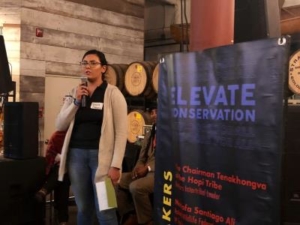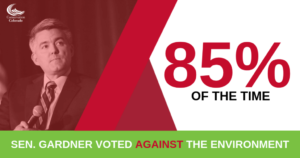DENVER – Today the Bureau of Land Management announced a plan allowing the gas drilling industry to dominate Colorado’s idyllic North Fork Valley with new oil and gas leasing. The plan failed to adopt a community-supported proposal that was under consideration by the agency to protect the water supply, wildlife and scenery of the North Fork Valley.
Previously, the North Fork Valley community has fought back three previous attempts to lease public lands for drilling close to the towns of Crawford, Hotchkiss and Paonia while the agency worked to complete its land use plan. The final resource management plan for the area will guide management of public lands for decades to come.
The Western Slope Conservation Center issued the following statement from Patrick Dooling, Executive Director:
“We are extremely disappointed that the BLM is moving forward with a plan that so clearly disrespects the wishes of our community and prioritizes drilling over all other uses here. The push to open our public lands for expanded drilling in Colorado’s premier sustainable farming and agri-tourism region is broadly opposed by local farms, businesses, and residents.
“The BLM’s final plan directly neglects the wishes of local governments, numerous organizations and countless citizens and shows that the current administration continues to prioritize the interests of the oil and gas industry over the public. We have fought back irresponsible drilling leases before and we fight back against this attempt to lock in risk of future drilling for years to come.”
The Wilderness Society issued the following statement from Jim Ramey, Colorado State Director:
“Instead of protecting the clean water supply that allows the North Fork Valley to thrive, the BLM is putting the gas drilling industry first.”
“It’s a shame to see Interior Secretary David Bernhardt, a native Coloradan, hand out favors to fossil fuel interests at the expense of local farmers, recreation businesses and the public here in his home state.
Not only does the plan sellout the community in the North Fork Valley by ignoring the locally-grown North Fork Alternative Plan, it also guts protections for critical wildlands across Colorado’s western slope. Places like Dry Creek Basin and Roc Creek – public lands that offer backcountry recreation, scenic views and important wildlife habitat – would be stripped of protections under the Trump administration’s proposed changes to the plan.”
Conservation Colorado issued the following statement from Executive Director Kelly Nordini:
“Today is just one more example of President Trump and Interior Secretary David Bernhardt putting the oil and gas industry ahead of local communities. Instead of helping foster the North Fork Valley’s thriving and growing agriculture and outdoor recreation economy, they are placing these sustainable industries in the crosshairs of an industry that threatens the very clean air, water and climate that helps these local businesses.”
“The Trump administration’s so-called ‘energy dominance’ agenda isn’t just a giveaway of public lands to their polluting industry friends, it mortgages Coloradans’ very future by exacerbating climate impacts instead of avoiding them.”
Why is this so important to western Colorado?
Why is this so important to western Colorado? Oil and gas development is incompatible with a healthy future for the spectacular North Fork Valley of western Colorado. The communities of the North Fork Valley are strongly opposed to oil and gas development, largely due to the negligible economic gains and the significant irreparable damage that could occur from oil and gas activities in the watershed.
- Clean Water: The North Fork Valley is a hub of organic and traditional agriculture and one of only two federally recognized wine regions in Colorado. Protection of the valley’s water supply relies on protecting the North Fork from source-to-use. Pollution must be prevented from entering this critical water system. For farmers and the agricultural economy, water quantity and quality are both of utmost importance. Organic agriculture, specialty crops, and high-quality hay all depend on abundant water free from contamination.
Surface contamination and spills, which occur regularly in Colorado oil and gas fields, could spread rapidly through the irrigation systems that water the valley. Oil and gas development is well-known to contaminate water supplies, both above and below ground, and to harm water bodies, rivers and source areas. That is a risk too great for operators in the valley, home to Colorado’s highest concentration of organic farms, an agritourism haven, and major headwaters to the Colorado River system.
- Wildlife: Of particular concern are impacts to mule deer, elk, Canada lynx, Yellow-billed Cuckoo, bald eagle and greenback cutthroat trout. Coupled with the impacts of existing energy development, additional leasing and development directly threaten rare mid-elevation habitat and the wildlife which depends upon it. The state currently does not possess adequate data on elk and mule deer populations in the area of the proposed development, and CPW staff have indicated that recent elk population numbers in the area have been in steep decline over the last few years. The local elk and mule deer are essential to the local economy, not to mention the ecology of our landscapes.
At risk in the final plan are some of the same lands the local community joined together to oppose leasing in 2011 and 2012, and again in late 2018. The initial leasing attempts prompted the BLM to consider a locally grown vision for the North Fork Valley that would keep energy development away from sensitive areas. The BLM agreed to consider the North Fork Alternative Plan in the Uncompahgre Resource Management Plan revision, however, the proposed final plan ignores the local community and undermines the citizens’ vision.
The BLM had been deferring leasing in the North Fork Valley while it revised the Uncompahgre RMP and made a long-term plan for managing the many values of this special landscape, but under Trump administration policies the agency is plowing forward with highly controversial, short-sighted leasing proposals. With its drilling above all other uses strategy for public lands, the Administration is deaf to the voices and vision the local community has worked with the BLM on for years. “Energy dominance” for the purpose of enriching fossil fuel industry executives could well result in farmers, winemakers and ranchers losing their livelihoods.
The North Fork Valley is too wild, too beautiful, and too productive to be sacrificed for oil and gas interests. Efforts to move forward with leasing in the North Fork Valley will continue to be met with strong opposition. The valley has produced energy for our country from public lands for over a century from its coal mines. Now is the time to protect remaining wildlands in the area for future generations to enjoy.
Cover image: North Fork Valley, CO. Mason Cummings, The Wilderness Society.


 Senator Gardner has failed to fulfill his advertised commitments to renewable energy and the environment. Between 2015 and 2018 he voted against the environment
Senator Gardner has failed to fulfill his advertised commitments to renewable energy and the environment. Between 2015 and 2018 he voted against the environment 

